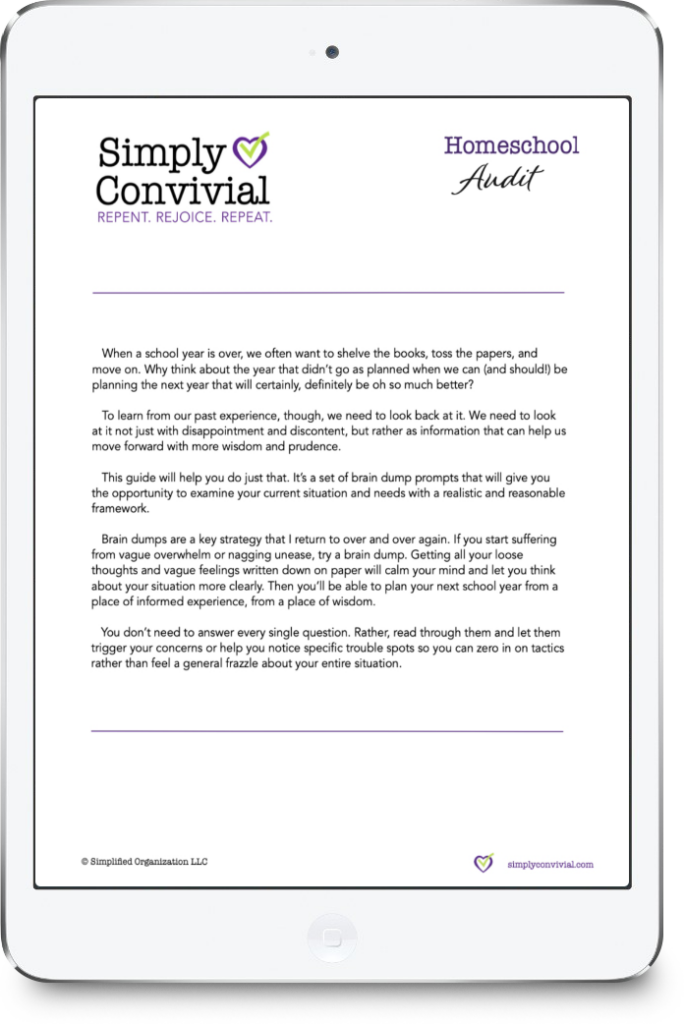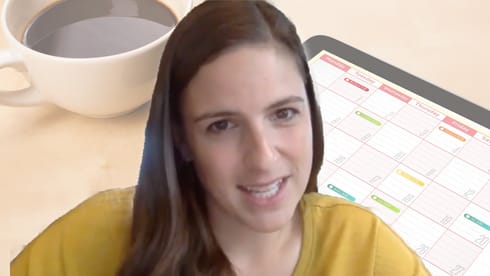
Dear Mom who wants to give her 5-year-old a classical education
Have you ever noticed?
The most eager homeschooling moms are those whose oldest child is 4 or 5?
I was one, myself.
And when I felt the eye-roll behind the smile of older, deep-in-the-trenches moms, I bristled. “Take me seriously!” I wanted to plead.
I knew they were sharing wisdom when they told me to back off and wait and just enjoy the young years. I browsed their shelves, watched a Math-U-See demonstration, picked their brains.
I was in my early twenties, and not only did I want to figure out this homeschooling thing before I started, I was still also figuring out who I was and who I was going to become.
Awhile back I received an email that went something like this:
I lean more Classical than CM at this point, but I still want to blend the two. However, teaching the grammar of each subject (including chants, jingles, tools) is the part I don’t know how to do just on my own. I’m much better at choosing books. Really, how do you go about this?
Do I just go with AO and stick something like Classical Conversations on top of it? That just seems like a crazy amount. Right now I’m thinking of using A Year of Playing Skillfully, with possible CAP’s Latin, and maybe adding some AO reading on top.
My son will be five in May and will have finished “100 Easy Lessons” for reading by then, so I won’t have to focus on teaching the beginnings of reading next year.
This isn’t the first email of this sort I’ve received, and I always want to write more than is technically appropriate for an email reply.
So that means a blog post.
I want the excited-to-homeschool mom whose kids are all under 6 to know: I will not roll my eyes at you. I will take you seriously.
And hear this passed-on wisdom, now that it’s my turn to be the pushing-40 older mom with teenagers:
Don’t buy any curriculum. Don’t plan out your entire scope and sequence.
And also hear this:
Not having a curriculum or a daily learning schedule does not mean this isn’t a vital point in your homeschool journey and in your child’s life.
That’s the real key, isn’t it? When we are told to wait on formal lessons, it feels like we’re being told that we’re trapped in an unimportant zone, biding our time until “real school” can commence.
That is not the case.
Let us not, therefore, waste the earliest years.
Quintilian
If you are excited to begin homeschooling, but it’s not time for formal instruction – or at least, not more than 15-20 minutes of formal instruction – you have a huge opportunity before you that will serve you well if you can use it well.
The beginning is the best time to lay strong foundations.
It’s not actually your child who needs the classical education at this stage – it’s you.
Learn educational philosophy now. Read the classics. Play classical music during the day and in the car. Learn some other art as well, because the practice of one art will help you in another (the art of teaching and homeschooling).
It is an art, not a science nor a program nor a formula, so approach it appropriately. You’re an artist, not a technician.
Although life is physically demanding and exhausting at this stage in the game, you also crave mental stimulation, so this is the time to read and read and read. Later, the children will be giving more mental stimulation than physical, and your energy availability will change.
If you’re eager to begin homeschooling classically, start by turning on some classical music and good audio books and play outside a lot, and while you’re supervising, read:
- In Vital Harmony by Karen Glass
- The Liberal Arts Tradition by Ravi Jain & Kevin Clark
- Beauty in the Word by Stratford Caldecott
- Norms & Nobility by David Hicks
- Poetic Knowledge by James Taylor
Stalk book lists and book sales. Stalk bloggers – I know I did. Chat with homeschool moms face-to-face, asking open-ended questions and just listen.

Perhaps volunteer to teach or help at a co-op, not for the sake of your 5-year-old, but for yourself, for growth in experience and wisdom as you see and hear others farther along in the journey.
Don’t jump the gun and commit to a program. Lay the foundations your children need – in yourself, first.
This is classical, not unschooling, I grant you that. But the ancients and the medievals did not create elaborate education regimes for the primary ages. There was no such thing as preschool or kindergarten or even first grade. These children, for the most part, just hung out at home with their moms. That’s normal, that’s traditional, that’s classical. Live a full life alongside your kids.
That does not mean they didn’t think the primary ages were important. Quite the contrary. Plato said:
The most important part of education is right training in the nursery.
Plato
As I’ve been reading The Great Tradition, I’ve noticed that when the classical authors speak of children, they admonish parents not to ship their kids off with servants or servile supervisors or foolish friends. They tell us we should speak correctly to our children and not indulge in baby talk. They tell us to teach them letters and tell them stories.
Education as a program, even classically, did not traditionally begin until the child was reasoning. Talk to a 9 or 10 year old child for a time and observe the difference between his thinking process and conversational ability and your 5 or 6 year old. When the oldest is 5 or 6, and he’s followed by younger siblings, he seems so smart, so capable. He is. But he is also still quite young.
Whatever you do, don’t try to start Latin with your 5 or 6 year old. Rather, read fairy tales, Aesop’s fables, and begin working your way through the 1000 Good Books list.
Don’t construct science experiments. Have him spend hours outside each day, and go to different sorts of outdoor environments to play. In Teaching Science So Students Learn Science, classical school teacher John Mays says that outdoor experience is the best foundation for later science learning, and it comes at a premium in this tech-driven age.
Start Morning Time, but not full-blown mimics of those who have older kids and have been doing it for years. Start with 15-20 minutes, including the reading of poetry and nursery rhymes. Pick a hymn and a Psalm to learn, add a new one every couple of months, and in ten years the amount you’ve filled your heart and mind with will astonish you. But it starts with one, not with a full binder.
Do not despise the days of small beginnings.

Classical education is not a set curriculum.
If you must choose a packaged curriculum for preschool, kindergarten, or even first grade, know that it is for your own peace of mind, not because your child needs it. Do it as a training for yourself more than for your child, hold it loosely, and expect to graduate beyond it with subsequent children.
After all, when your oldest is 4, 5, or 6, you do have to be more intentional. What older moms often forget is how sparse and stretched a home with all littles can be.
My fifth child is now five and I do much less intentionally for her than I did for my oldest at the same age. But that’s ok. Because her life is more naturally full of maturity and learning. Her older siblings play games, tell stories, talk about their books.
In Morning Time, where she can come and go as she please, we’re reciting Scripture, catechism, creeds, poems, and Shakespeare. We’re praying, singing, and listening. It’s rich, and she’s along for the ride.
When my oldest was her age, he was helping steer the ship. Your oldest helps set the family culture in a way other children do not. Get them on board young – not by pushing them, but by keeping the tone light and upbeat and not forcing confrontation.
You’re learning the ropes. You’re not unschooling or being a push over if you skip lessons when your 5 or 6 year old is tired, cranky, or distracted. Work with what you have, with where you are.
Expose your children to truth, goodness, and beauty in “behind the scenes” sort of ways more than in “Mommy is the captain of this ship, so shape up” sorts of ways. Put on good music. Go to a variety of parks. Visit a museum or zoo or aquarium. Read books. Read lots of books – aloud, on audio, for yourself, to your kids.
Before you know it, you’ll be chanting Latin declensions, correcting sentence diagrams, and figuring out how best to review regularly all you’ve accumulated in Morning Time. But let those times come when they come; don’t rush them.
When you spend hours out of doors in a variety of settings, when you read books yourself and also aloud to your children, when you listen to good music and attend church and teach your children to exert self-control in daily life – you are classically educating them.
Do not despise the day of small beginnings.
Read related posts:
- Looking Back: What I Wish I’d Known About Homeschooling in the Early Years by Brandy Vencel
- 6 Ways to Early Years You Won’t Regret by Sarah Mackenzie

HOMESCHOOL AUDIT
Make next year better based on how this year went.
Download the free homeschool audit and use this year’s experience to make next year better.



